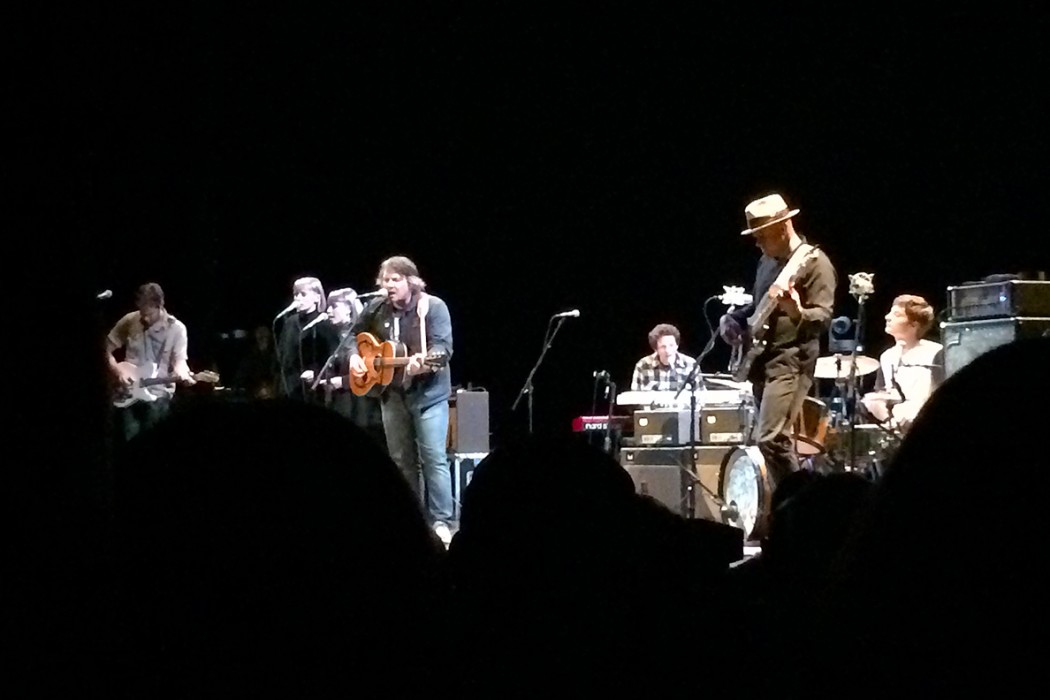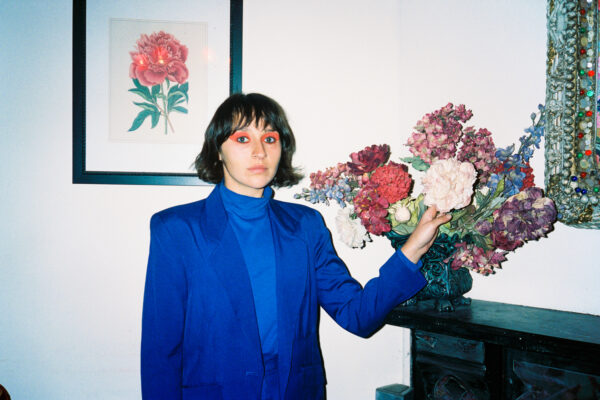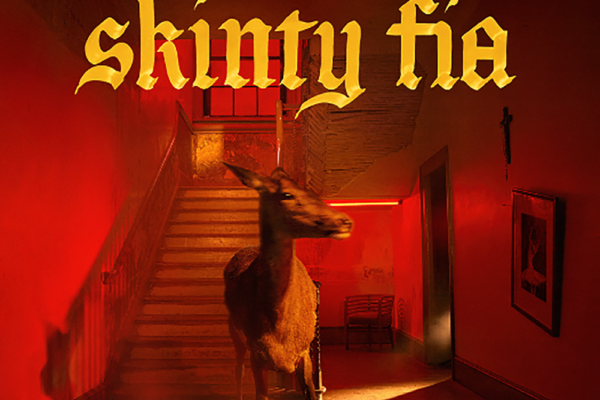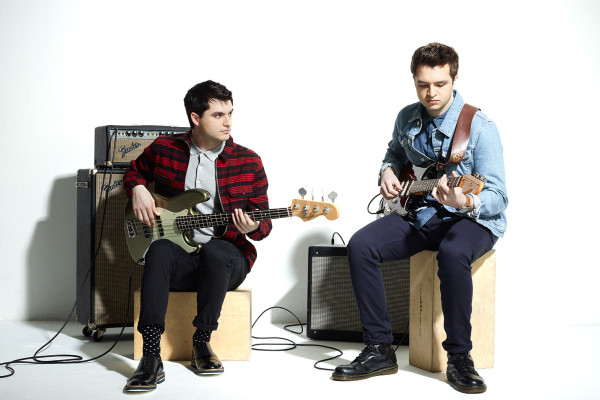The Next Wave Festival at the Brooklyn Academy of Music was an appropriate space for the record release of Tweedy’s Sukierae. The night was also part of a celebration of record label Nonesuch’s thirty years, and while they are mostly known for their work in Classical, they were, most famously, the Warner Brothers subsidiary that picked up Wilco’s Yankee Hotel Foxtrot from Reprise, another Warner Brothers subsidiary. It was a night, then, to celebrate, the past and future, new beginnings, and music on the edge.
Brooklyn-natives Hospitality opened the night with a full, but brief set. They are one of those bands that music writer believe to be constantly on the verge of a major break; they are one Zach Braff soundtrack or Apple commercial away from the mainstream. And that’s not without good reason: their first two albums are so chock full of alterna-pop goodness that it is a mystery to this music writer that they haven’t yet. But don’t let the twee turn you off, it’s mostly a cover for the wan reality of their music.
This was ever present during their live set as the apparent apathy of Amber Papini gave way to the jangle of the songs, fluctuating between the two polar opposites with the simple downstroke of a major G barre chord. At times, though, it was hard to tell if the apathy was all for show; on more than one occasion Papini bungled up the simple crowd pandering (stuff like “you’re a great audience,” “Brooklyn is our home town, it’s great to be back,” and she even forced the bassist to announce his own birthday).
What was lacking in stage presence was more than made up for with guitar presence. Rocking a candy-blue humbucking Fender Mustang, Papini’s was smooth and clean, landing somewhere between the melo-drama of a Cars ballad and the soft parts of Pixies songs. It struck me that although the songs didn’t feel weighed down by verse-chorus-verse, the guitar playing, especially the solos were predicated on repetition, to great effect.
The rhythm section was simply a vehicle to further the song until the latter half of the set when the drummer and bassist seemed warmed up. The drummer had no real solo, but had moments where you could tell he was cutting into the groove. The bassist —a left-handed Hofner bass player—broke out of his shell when the fuzz pedal went on and his lines bordered on improve. We certainly don’t have the next Jaco here, but his contributions to the set made me want to revisit the albums to listen for his input.
Hospitality’s set, while excellent, went mostly unappreciated — half the crowd, maybe a full three quarters had yet to show up. Conveniently, this brings to mind the chorus of Slim Dunlap’s “Ballad of the Opening Band:” “You we’re gonna be the singer on the hit parade,/ Instead you’re just the singer warming up the stage,/ Tomorrow’s latest rage. “
The crowd was filling out only five minutes before Tweedy came on stage, and when they did it was to loud applause. At first glance, it’s a bit strange—their first album had been out for less than 24 hours at that point—, but not strange for a band led by Jeff Tweedy, the greatest American Songwriter of the last 20 years. The big story here is that this has become a family thing. Jeff’s son Spencer is at the helm of the drum kit both on the album and on the tour. The pairing seemed eventual: Jeff had covered the Slim Dunlap song for Songs for Slim, and Spencer played on that. When he produced Mavis Staple’s second millennial album, Spencer played on that, too.
Jeff and Spencer and the rest of the Tweedy touring band are a visual representation of all the night represents. Jeff and bassist Darin Gray are, well, old. Spencer, guitarist Jim Elkington and multi-instrumentalist Liam Cunningham are young. Jeff joked that he knew Darin longer than Spencer and Liam had been alive. For some of the songs, the great Lucius (Jess Wolfe and Holly Laessig) would sing back up. And while Jeff has taken on somewhat of a Patriarchal role, here and in general, what they played was not dad rock in any sense.
The band breezed through the songs, as if a well rehearsed set list, as it should have been considering that they were live streaming the concert. But they did have that new car smell to them, probably owing to the younger members who couldn’t have been more than 20. They were at best with the more traditional tunes that the elder Tweedy writes, those 21st century folk songs that made Uncle Tupelo and Wilco so great. They lacked a panache only during the more experimental bits, but I’m sure a lot of that comes from my love of Wilco, a band I have seen live many times, but also, a band that is hard to compartmentalize away. Jeff will always be Jeff Tweedy from Wilco.
This was confirmed when after a good hour maybe of music, the band dropped away and Jeff played a bunch of songs from his more famous iterations. “I Am Trying to Break Your Heart” and “Passenger Side” and “A Shot in the Arm” are all crowd pleasers at Wilco concerts, as they were here. He took some audience requests, most notably the deep cut “Radio King” from Golden Smog, having to retune his guitar onstage to do so. He performed “Jesus, Etc.” with a simple acoustic riff and Lucius backing vocals that stripped the song of the schmaltz that Wilco has been performing the song with lately.
You come to realize that, despite this being a father/son thing, and despite the showmanship of the band, this night celebrated more than anything Jeff Tweedy and his ability as a songwriter. The precept of a solo album is that you are solo, and except for the drums, on the record he nearly is. And when he was on stage with just his acoustic guitar, the beauty of his songs shone through.
Which, then, appropriately, the encore consisted of not one, but four cover songs. “Love Like a Wire” by Diane Izzo and “Give Back the Key to My Heart” by Doug Sahm, both relative unknowns. “Only The Lord Knows” by Mavis Staples. And, for a great finale, bringing out Nels Cline to do “California Stars.”
What’s next for Jeff Tweedy? Hopefully another Wilco record. And for Spencer and the other kids? Probably great things (I’m sure this will look good on a resume). And how great it was to look back on his songs so familiar in another context. (And let’s not forget about the opening band, Hospitality.) So it really was the perfect balance of past and future, all taking place in the present.
Except for the fact that Darin Gray kept doing the robot while playing bass. Did I mention that? Because he was doing the robot the whole night like a boss.
Article by: Christopher Gilson




